Ariosto: Orlando Furioso
Canto XI: Orlando and the Sea-Monster
Translated by A. S. Kline © Copyright 2021, All Rights Reserved.
Illustrations photographed and digitally restored from the Fratelli Treves edition (Milan, 1899) by A. D. Kline.
This work may be freely reproduced, stored and transmitted, electronically or otherwise, for any non-commercial purpose.
Conditions and Exceptions apply.
Contents
- Canto XI: 1-6: Angelica employs the ring and vanishes
- Canto XI: 7-12: She sets out to seek her own realm
- Canto XI: 13-17: Ruggiero comes upon a knight fighting with a giant
- Canto XI: 18-20: The knight is Bradamante whom the giant bears away
- Canto XI: 21-28: Ariosto’s tirade against ‘modern’ weapons
- Canto XI: 29-32: Orlando reaches the island of Ebuda
- Canto XI: 33-36: He prepares to attack the sea-monster
- Canto XI: 37-41: He succeeds in tying it to the rock
- Canto XI: 42-45: And ends the creature’s evil reign
- Canto XI: 46-51: Orlando is attacked in turn by the islanders
- Canto XI: 52-55: The Irish army lands, as he recognises Olimpia
- Canto XI: 56-61: The Irish are led by King Oberto
- Canto XI: 62-64: Orlando relates Olimpia’s story
- Canto XI: 65-72: The King is smitten with love for her
- Canto XI: 73-76: He vows to return her to her proper place
- Canto XI: 77-83: Orlando continues his search for Angelica
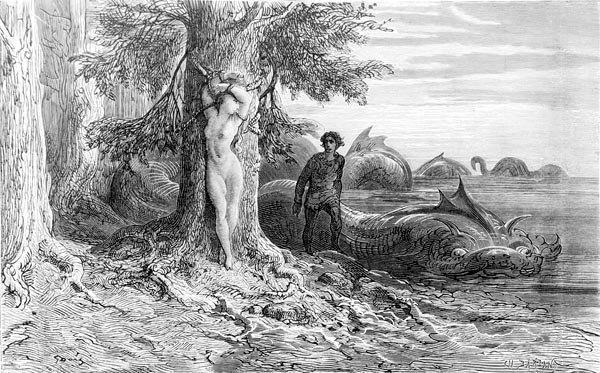
Canto XI: 1-6: Angelica employs the ring and vanishes
Although the weakest rein, employed mid-course,
May serve to restrain a too-lively steed,
Reason’s steel bit will scarce possess the force
To turn desire from its straight path; indeed,
Where pleasure is involved, refined or coarse,
Like a bear at the honey, filled with greed,
Passion will not soon desist, the sweetness
Having scented, or sipped at with success.
What reason had our knight then, to restrain
Himself from taking pleasure in the maid;
Fair Angelica, who was, to be plain,
Alone and naked in that pleasant glade?
No thought of Bradamante gave him pain,
To whom such homage, once, his heart had paid;
And foolish he, who thinking of her yet,
Were such a prize as this maid to forget;
With one in such a state Xenocrates
Would not have proved himself more continent.
Ruggiero cast his arms aside, to ease
His impatience, thus balked of his intent,
As she, all naked to the passing breeze,
Her eyes downcast in shame, and in dissent,
Saw there the precious ring on her finger,
That Brunello, in Albracca, took from her,
The very ring she’d carried into France,
The first time she had made that journey,
Her brother by her side (he bore the lance
Which Astolfo acquired); with this ring she
Made Malagigi’s spells fail to advance,
By Merlin’ stair, and, on a morn, set free
Brave Orlando, and many another,
From cruel servitude to Dragontina.
Rendered invisible, she fled the tower
Where an old villain had imprisoned her;
(And yet, as well as I, you know the power
Of the precious thing, so I’ll not linger.)
This ring Brunello, in an evil hour,
Took, for Agramante, from her finger.
Since then, Fortune had held her in disdain,
Such that her realm was lost, as I made plain.
Once, as I’ve told, she saw it in her hand,
She was so full of pleasure and surprise,
She thought it but a dream, you understand,
And scarce believed it there, before her eyes.
Silently, she raised the encircling band
To her lips and, as fast as lightning flies,
She was hidden from Ruggiero’s sight,
As sudden cloud will veil the sun’s fair light.
Canto XI: 7-12: She sets out to seek her own realm
Ruggiero gazed about the whole shore,
And then ran all around, searching madly,
And then he thought of the ring once more,
Stood stupefied, and cursed himself sadly;
Again, at his own carelessness, he swore,
Accused the lady of discourtesy,
And blamed her for her unkind attitude,
Who’d repaid him with sheer ingratitude.
‘Graceless maiden, is this all my reward?’
He cried, ‘Is this your thanks for all my aid?
Why rather steal what I can ill afford
Than own it as a gift? Be not afraid,
To take the winged steed, the shield, my sword,
And I myself; for, thus, I would be paid,
As long as your sweet face I still may see.
I know you hear me, cruel one; answer me.’
So saying, he groped all about the fountain,
And yet, in vain, embraced the empty air,
Searching widely round him as do blind men,
Hoping he might come upon her there!
She, who was now far distant, fled again
Until to some deep cave she might repair;
And soon a spacious cavern met her eyes;
Within, a store of food, to her surprise.
For here an ancient herdsman used to stay,
That tended to a herd of mares, which strayed
All through the vale, and grazed, many a day,
About the fresh grass where the waters played,
And there were stalls within the cave, I say,
Where, from the sun at noon, they sought the shade.
She, the ring now dormant on her finger,
Hid from sight, did in the shadows linger.
And then, at evening, when she felt refreshed,
By rest and food, intending to depart,
Her body in but rustic clothes she dressed,
Far different than those that won her heart,
Green, yellow, purple, blue and red, the best
Of fashions, shaped with subtle grace and art.
And yet she could not don so coarse a wear
As not to seem a noble maid, and fair.
Be silent, you who praise Neaera, Phyllis,
For neither was as lovely, none in Greece,
Not Galatea, nor Amaryllis:
Tityrus and Melibaeus, be at peace!
From out the stall she took a mare of his,
The herdsman tended; thinking, without cease,
Of that fair realm that once had been her own:
She’d seek now the Levant, and her lost throne.
Canto XI: 13-17: Ruggiero comes upon a knight fighting with a giant
Meanwhile our Ruggiero (who had spent
His time in thinking she might reappear,
Gripped by that fantasy, though she, now absent,
Was neither close beside him, nor could hear)
Reflecting now, to his winged charger went,
Ready to search for her, both far and near;
But having slipped its halter, that strange steed,
Taking flight, had vanished, at full speed.
Twas a dire and grave addition to his loss
Of the maid, while she now owned the ring;
It pained his heart, and made him just as cross
As her deceit, to lack that precious thing;
For much as it now pained him that because
Of her scorn for him, the maid was missing,
He mourned the ring, more than for its power
That twas his lover’s gift, in a dark hour.
Grieving sorely, yet, in armour once more,
Shield on shoulder, he now went on his way;
And, crossing a grassy field, left the shore,
Towards a broad valley, in which there lay
A wide and beaten track, upon the floor
Of a dense wood that hid the light of day.
He had not journeyed many yards within
Ere, on his right, he heard a mighty din.
A fearful clash of arms it seemed to be;
He hastened there, and found a martial pair
In furious dispute, twixt tree and tree,
In a narrow glade, its shape small and square.
They lurched, quite without regard, or mercy,
On what grounds I know not, here and there.
The one a giant laboured in proud fight;
The other was a bold and gallant knight.
The latter leaping to and fro, with shield
And gleaming sword, defended skilfully,
Lest forced by the two-handed mace to yield,
The giant deployed, and be conquered wholly,
His horse already lay there on the field,
Quite dead; Ruggiero watched intently,
And soon his wishes and desire inclined
Towards the knight, the weaker to his mind.
Canto XI: 18-20: The knight is Bradamante whom the giant bears away
Yet not for that cause would he intervene
But rather stood aside, to watch the fight.
Behold, the greater foe’s strong mace was seen
To strike the helmet of the lesser knight.
At that harsh blow, the knight was felled, I ween;
The giant on seeing his stunned foe alight
Upon the grass, the knight’s helm did unlace,
Thus, Ruggiero saw the warrior’s face.
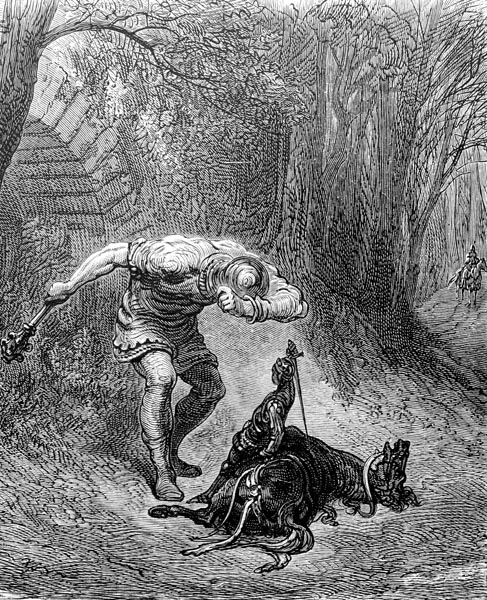
It was the visage of his sweet and lovely,
And most dear lady, he now saw revealed,
That of his very own Bradamante,
Whom the giant would slay upon the field.
Summoned, thus, to battle, suddenly,
He advanced, to force the giant to yield,
While he, not wishing to prolong the fight,
In his arms scooped up the half-dead knight,
Flung her o’er his shoulder, and sped away,
As a wolf will a lamb, or an eagle
Will carry off a pigeon or like prey,
Then soar upwards fast as it is able.
Ruggiero saw, and ran in his dismay
To do all of which he was capable,
And yet so vast the strides that giant made,
He scarce could see him, once he’d left the glade.
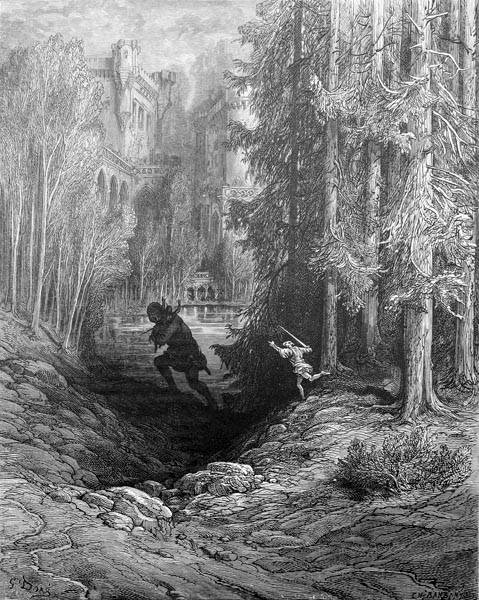
Canto XI: 21-28: Ariosto’s tirade against ‘modern’ weapons
The one in flight, the other pursuing
Down a dark and overshadowed trail,
That yet widened, gradually piercing
The wood, they reached a meadow, in the dale.
But no more of that; for, now, returning
To brave Orlando, I pick up the tale,
Who’d drowned Cymosco’s cannon deep below,
So that the earth might such no longer know.
But all in vain; the impious enemy
Human nature, ever the inventor,
Taught the iron ball, like the darts we see,
To soar in air then land on terra firma,
Thus, creating no less havoc, surely,
Than when Eve was deceived, as ever,
By that apple some enchanter had in store,
In our ancestors’ day, or a bit before.
More than a hundred fathoms buried deep,
It must have lain there for many a year,
Ere, by enchantment raised from its sleep,
The cannon midst the Germans did appear,
That, by one trial or another, sought to reap
Knowledge of its powers; and thus, I fear
The bold demon, working on minds unfit,
That seeks our harm, found further use for it.
Italy, and France, and then most every
Land on earth has learned the cruel art.
Some, liquifying bronze, in their country,
Pour it into moulds, others, for their part,
Bore iron, to create the tubes they fancy,
Large or small, as will suit the ball they dart.
One a bombard was called, an early one,
This a single, that a double-cannon,
Falcon, saker, culverin, such are named,
Those the titles their inventors bestowed.
They split strong steel, and solid stone, as claimed,
And, where’er the ball passes, clear a road.
Send your sword to the forge, for it is shamed,
Wretched soldier, let all such things be stowed;
A carbine or musket you must shoulder,
(Or not be paid) ere you are much older.
Foul, vile, invention, how did you ever
Achieve a place within the human heart?
Through you, martial glory’s lost, for never
Shall war prove, now, an honourable art.
Strength and courage are a vain endeavour,
Now the worse can play their better’s part.
No more shall gallantry or ardour yield
Some paragon of virtue in the field.
Through you so many lords and knights must die,
And vanish neath the ground, before this war,
This conflict that has made the whole world sigh,
(Yet Italy, amongst the nations, more
Than most) shall end. I say, and do not lie,
That he was worse than all that went before,
And crueller, who first such things designed,
Cursed with an impious nature, to my mind.
And I believe that God shall so pursue
The eternal vengeance, that deepest hell
Will receive his spirit, amidst the few
That with accursed Judas there must dwell.
Yet of brave Orlando, who burned anew
To reach Ebuda’s foul isle, we must tell.
For lovely women, were delivered there,
Still living, to the monster, for its fare.
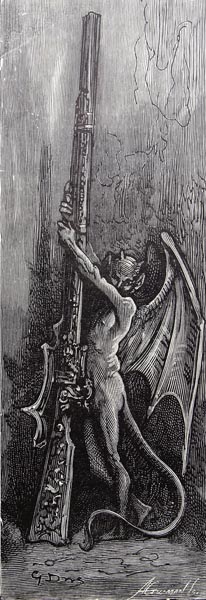
Canto XI: 29-32: Orlando reaches the island of Ebuda
Yet whatever eagerness the knight possessed
It seems the wind had less desire to blow,
At least in that direction; east or west,
At prow, or stern, gusting, as if to slow
The ship, the breeze blew, then sank to rest,
While little progress could be garnered so;
More often he was forced to go about,
Tacking to port or starboard, if in doubt.
It was God’s will he should not reach that isle
Before the King of Ireland reached that lair,
More easily to do what, in a while,
I shall explain to you, and gladly share.
‘Make for the shore now, and in goodly style,
Dear captain,’ said Orlando, ‘anchor there,
Where I may use the skiff, for I shall go
To the rock, and without companions, so.
Bring me the biggest cable yet aboard,
And with it the very largest anchor,
And a sight of their purpose I’ll afford
When I seek to approach the vile monster.’
He had the skiff lowered, once they’d moored;
With all he needed for this fresh endeavour,
(But for his sword, he left his arms behind)
He then set forth, unsure of what he’d find.
He drew the oars to his chest, set his back
To the rocky isle he sought to attain,
In the way a crab that from the sea-wrack
Or the marshland seeks the shore to gain.
Twas the hour when, o’er the Sun’s bright track,
Aurora her gold tresses spreads again,
(That orb half-seen, half-hidden in the sea,
Rousing, once more, Tithonus’ jealousy)
Canto XI: 33-36: He prepares to attack the sea-monster
As soon as he’d approached the naked rock,
Yet was a good stone’s throw still from its side,
He thought he heard, if naught his ears did mock,
A cry, that o’er the waves did faintly glide.
Steering to port, then, as he neared that block
Of granite, he gazed blushing at the tide;
He’d spied a maid, naked as she was born,
Her feet bathed by the waves, bound there, forlorn.
Because she was some distance from him, still,
And bowed her head, he could not well discern
Whom she might be, yet pulled hard with a will,
Upon the oars, some further news to learn.
But now a mighty roar the air did fill,
Which the woods and caves echoed in their turn.
The waves broke, and revealed, thus, to the light,
That monster that nigh hid the sea from sight.
As a cloud is seen to rise from some moist vale,
Pregnant with rain and storm, that extends
More than the darkest night, o’er hill and dale,
And to the day the deepest shadows lends,
So, the creature o’er the wide sea did prevail,
Such that it seemed that, to achieve its ends,
It must drown all; Orlando held his place,
Proudly, his courage steadfast as his face,
And, like a man possessed of firm intent,
Moved swiftly to achieve what he had planned.
Thus, to defend her from the beast’s advent,
And yet attack the thing with a free hand,
Between her and the whale, the skiff he sent,
His sword still in its sheath, you understand,
Then gripped the cable tied to the anchor,
Waiting its charge, yet steadfast in valour.
Canto XI: 37-41: He succeeds in tying it to the rock
Now, as soon as the monster had drawn near,
And saw the skiff, with the brave Orlando,
It oped its mouth so wide it would appear
A man might ride his horse within it so,
Orlando (in the skiff, to be quite clear)
Plunged within it, set the anchor in tow,
And attached the sharpened flukes, so it hung
In the whale’s palate, having pierced the tongue.
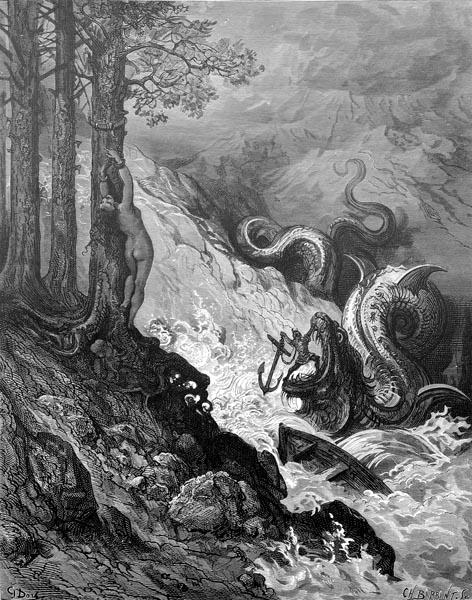
And so, the monster could no longer close
Its jaws which were pierced above, below,
As, in a shaft, the miners props dispose,
Along its length, to hold the ceiling so,
Lest where they pass sudden ruin follows;
Like to their timber that strong steel did show.
Orlando could not touch the anchor’s tips
Unless he took a leap, between those lips.
Orlando having now secured the jaws,
So the beast could close its mouth no longer,
Unsheathed his sword and, without pause,
Set about that darkened cave, in anger.
The monster could no more, despite its roars
Defend itself than can some even stronger
Fortress, once the foe’s inside, from the knight,
That, within its throat, carried the brave fight.
The vast creature, now overcome with pain,
Showed its huge flank, and rolled in the water,
And then descended to the depths again,
Scouring the sea-bed, sand trailing after;
While Orlando, drenched by a salty rain,
Swam forth, once alerted to the danger,
Leaving the anchor fixed there, but gripping
The long rope still tied to its iron ring.
Orlando swam with the cable, swiftly,
To the rock, where a footing could be gained.
And drew the rope towards him, sharply,
Till the anchor’s twin flukes advantage gained.
By a force, which now exceeded every
Other, the monster felt itself constrained,
A force that with a single pull did more,
Than ten turns of a windlass could ensure.
Canto XI: 42-45: And ends the creature’s evil reign
As an untamed bull, feeling a like force,
When its horn is roped, leaps here and there,
And spins around, now lacking all recourse,
Arches its back, but cannot shed the snare,
So, from its ancient place, on a fresh course,
The whale, dragged by an arm without compare,
With strange flicks of its tail, did roll and squirm,
While the anchor between its jaws held firm.
From its mouth, such a fount of blood now flowed,
Those depths the Red Sea had been aptly named,
While it struck the waves so, pricked by that goad,
Sight of the sea-bed folk might well have claimed.
Brine drenched the heavens, till the bright sun showed
But dimly through the flood, so high twas aimed.
While came the echo of that deafening roar,
From woods, and hills, and e’en the distant shore.
Forth from his grotto swam old Proteus,
And rose towards the surface at the sound,
In time to see our knight, with scarce a fuss,
Dragging the monster towards solid ground,
And, forgetting his multifarious
Flock, left them there, scattered all around,
While Neptune yoked his dolphins to his car,
And fled for Ethiopia afar.
Now Ino, weeping, with Melicertes
On her back, the Nereids their hair astray,
Glaucus, the Tritons, all within those seas,
Swam, here and there, all seeking for a way
To save themselves, as our brave knight, with ease,
Drew the vile monster slowly from the bay;
Yet needlessly; its wounds had proved so sore,
The whale had died there, on the ocean floor.
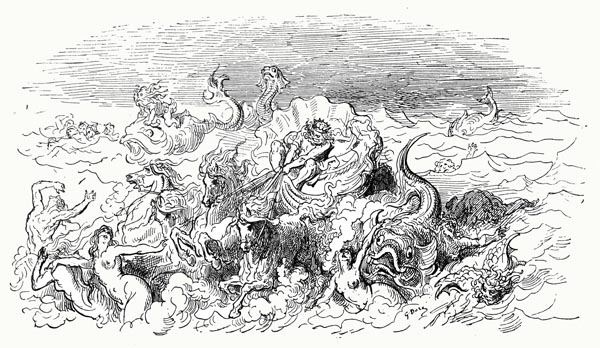
Canto XI: 46-51: Orlando is attacked in turn by the islanders
Quite some few of the islanders had run
To assess the result of that strange fight,
Who, prompted by religious unreason,
Saw such sacred work in a darker light,
And called it another sad wrong done
To Proteus; twould anger him outright,
And make him send his sea-herds to the shore
And inflame the ancient conflict once more.
They said it was better to sue for peace,
From the offended god, or suffer worse,
And that was best achieved by the decease
Of the culprit, removing thus the curse,
By drowning. As a torch-flame we release
By spreading it abroad grows to immerse
A stubble-field, so was their anger spread,
Blind fury, that would see Orlando dead.
Armed with spear or sword, sling or bow,
This savage horde descended to the shore,
Then, from far or near, to strike him, did go
About him on both sides, behind, before;
He wondered at the anger they did show,
And the monstrous ingratitude they bore
Towards their saviour; a most vicious horde,
Whence he had hoped for glory and reward.
But as the bear that’s led by some Russian,
Or Lithuanian, towards the fair,
Passing through the street, shows its opinion
Of the pack of dogs that goes yelping there,
Ne’er turning round, so on this occasion,
Orlando, fearless, gave them little care,
Knowing it was but a simple matter
With a single breath, to make them scatter.
Indeed, he swiftly made them yield their ground,
Unsheathing Durindana, his sharp blade,
The foolish crew believing they were bound
To conquer one they’d shortly see dismayed,
Since not a shred of armour clasped him round,
(He lacked a shield, a sorry foe he made)
Not realising that, from head to toe,
A hide tough as diamond clothed Orlando.
He did to others and most readily,
What, to our knight, no other man could do;
In ten blows, he thus dispensed with thirty,
More, if my count of blows is less than true;
He cleared the sand about him easily,
And then the captive lady sought anew,
When suddenly new noises and fresh cries,
From elsewhere upon the shore, did arise.
Canto XI: 52-55: The Irish army lands, as he recognises Olimpia
While Orlando was holding at bay
That horde of barbarous islanders,
The Irish, unopposed, had made their way,
Onto the island from several quarters.
And set themselves to pitilessly slay
Its population, the wives and daughters
Too, for moved by justice or pure rage,
They killed all, regardless of sex or age.
Scant defence was offered by that crew,
Partly through being taken unawares,
Partly because their numbers were so few,
And those few unused to martial affairs.
Put to the sack thus, carnage did ensue;
Some burned to death, the rest slain in their lairs.
What walls survived they then razed to the ground.
No living soul there, afterwards, was found.
Orlando, as if the tumultuous cries,
Concerned him not, now approached the lady,
Still chained to the barren rock, you realise,
Prey to that monstrous whale, slain but lately.
He knew her, now she stood before his eyes;
More and more so, as he viewed her closely.
Twas Olimpia, of this he felt assured,
Whose loyalty had gained such ill reward.
Wretched Olimpia, who, beside the scorn
Love had shown, found that ill-fate pursued her,
Sending the pirate crew, who then had borne
Her off (that very day) to foul Ebuda.
Orlando knew her, bound there, all forlorn,
To the rock, but seen while wholly nude, her
Head was bowed, nor dared she raise her eyes,
Nor could she speak a single word likewise.
Canto XI: 56-61: The Irish are led by King Oberto
Orlando asked what evil trick of fate
Had thus conveyed her to that cruel land.
From the fair place where she had been, of late,
Most happy, with her consort there to hand.
‘I know not, if I should communicate
My thanks,’ she said, ‘that thus, preserved, I stand,
Or should regret that, thanks to you, I see
No likely end to pain and misery.
You have my gratitude for my salvation,
Rescuing me from death in that fell maw;
(Monstrous, indeed, if I, in such a fashion,
Were lost in that whale’s belly, evermore)
Yet not that I must bear with the frustration
Of living on, for death were best, I’m sure.
Great my thanks would prove, were you to bring me
That which could end my woe completely.’
Then, with many a tear, she related
How her love had betrayed her, on a day,
And left her sleeping, nigh the shore, fated
To be found by pirates, and snatched away.
And as she spoke, growing more animated,
A Diana seemed, whom sculptors portray,
In the fountain, scattering (as she did now)
Drops of cold water, o’er Actaeon’s brow,
Hiding her lovely front as best as she might,
And her full breasts, though somewhat liberal
With her hips and flanks, still in plain sight.
Orlando, after a brief interval,
In which he freed her, conscious of her plight,
Went for a robe, to raise her lost morale;
Meanwhile Oberto, King of Ireland, came,
Who’d found the beast, slain by our very same
Orlando, and had heard how a brave knight
Had swum, and fixed an anchor in its throat,
And dragged it to the shore then, as one might
Against the current, drag a tethered boat.
To find if the tale had been told aright,
Oberto came, who thought it of some note,
While his men burned and ravaged, far and wide,
Laying Ebuda waste, on every side.
The Irish king (though finding that Orlando
Was dripping wet, and stained with blood and gore,
Wet with the blood that from the beast did flow,
As he’d quit its mouth and set out for shore)
The visage of this knight did surely know,
Realising that it was the Count, and more
Certain, in that he’d thought, on first hearing,
None but Orlando could achieve this thing;
Canto XI: 62-64: Orlando relates Olimpia’s story
Knew him, having been a page of honour
At the French court, leaving the year before
To receive the crown of his dead father.
Many a time he’d seen Orlando, more
Had spoken with him, and oft thereafter.
He ran to greet him, on that barren shore,
Removing the steel that guarded his head,
Clasping him tightly, once the helm was shed.
Orlando (no less pleased to see the king
Than was the king to see the noble knight,
Once they’d completed their embracing
And were done with all that clasping tight)
Told the tale of betrayal, narrating
All that was done to her, and did indite
Bireno, the traitor, who should rather
Have proved far kinder than any other.
Our knight told of the many times that she
Had given proof of her deep affection,
Of how her kin and realm were lost wholly;
Of how she’d have died for his salvation,
That Bireno; that a witness was he
To this, and her story was no fiction.
And while he spoke, the lady’s shining eyes
Were drowned in tears, amid a wealth of sighs.
Canto XI: 65-72: The King is smitten with love for her
Her face was like those skies we see in spring,
When, midst brief rain, the sun will part the veil
Of cloud and, from the vapour, issuing
Light the flowers and trees, in wood and dale.
And, as the nightingale joys in singing
Amidst green branches then, o’er some moist trail,
Amor now bathed his plumage in her tears,
Delighting in that whence he oft appears.
The Love-God set his arrow-tip ablaze
At her bright eyes, then (in that flowing stream
That, twixt blooms white and crimson went its ways)
Tempered the metal, golden was its gleam;
Drew his bow, and fired his dart, as always,
At one no shield defended, so I deem,
Who gazing at her tresses, eyes, and brow,
Felt that his heart was pierced, but knew not how.
Her loveliness was of the rarest kind,
Not in the curve of that smooth brow alone,
But in the cheeks and hair, such eyes as blind,
Mouth, shoulders, throat, there was her beauty shown;
From those fair breasts that Nature had designed,
Down to those parts that are so seldom shown,
All was of such excellence, that no peer
Had she, in all the world, so twould appear.
Her skin was whiter than the untouched snow,
And, to the touch, felt smooth as ivory;
Gently rounded, her breasts like milk did show,
Poured from a jar, midst green rushes, sweetly;
The shadowed space between them seemed to flow
Downwards like a vale twixt two mounts, surely
Sweet in its season, seeming now as when
The winter’s snows had filled its depths again.
Her swelling hips, and flanks, were both lovely,
The flat belly smoother than a mirror,
And those white thighs, both turned with artistry,
As if by Phidias, or his master.
And what should I say of all else that she
Sought to conceal in vain? Naught seemed lesser.
In sum, from head to foot, the eye could see
What beauty means, in its entirety.
If by the Phrygian shepherd, Paris, she
Had been viewed, on the slopes of Mount Ida,
Would Venus have boasted of her beauty
Whom Paris judged to be the lovelier
Of the goddesses? Nor perchance would he
Have sailed to Sparta, and gained that other.
‘Fair Helen,’ he’d have cried, ‘stay there; be wise,
Love Menelaus; here’s the greater prize.’
Or if she had dwelt there, in Crotona,
Where Zeuxis made his lovely images,
When, Juno’s temple to adorn, that painter,
Viewed every naked model that might please,
And then, to compose the perfect creature,
Selected this one’s breasts, and that one’s knees;
Need he have chosen this or that to shun,
When all he sought was present there in one?
Surely, Bireno never viewed the beauty
Of all her naked form or, I am sure,
He’d never have displayed such cruelty
As to have left her on that barren shore.
That it had roused Oberto, all could see;
Love’s flame had pierced him to the very core.
He sought to fuel her hopes, as best he could,
That present ill would end in future good.
Canto XI: 73-76: He vows to return her to her proper place
He swore he would carry her to Holland,
And there restore her to her proper place,
And that the perjured traitor, once at hand,
Just and memorable sentence would face,
While with the troops he had at his command,
He’d wage fierce war on all that was most base.
Meanwhile he bade men this request address,
To find the maid a bodice and a dress.
There was no need to search beyond the isle,
To gather proper female apparel,
Since every day to feed that monster vile
Maids were brought, and theirs would do full well;
They brought a cartload in a little while,
That would suffice, as far as they could tell.
Olimpia dressed, though it yet irked the king
That he must fail to clothe her to his liking.
But ne’er fine silk nor gilded cloth, you’ll find,
Have the busy Florentines woven, ever;
Nor have the rest embroidered them and lined
Such fair designs, no matter how clever;
Nor Athene nor Hephaestus, to my mind,
Woven garments, the goddesses to cover,
Worthy to hide those limbs, that so enthralled,
And which perchance he, now and then, recalled.
In most respects, Orlando was content
To see that she had kindled such a love,
Knowing Bireno swiftly must repent
Of treacheries the Irish king could prove,
For it removed one last impediment
To his own quest, and left him free to move;
He had not sailed for Olimpia the fair,
Rather to find his love, had she been there.
Canto XI: 77-83: Orlando continues his search for Angelica
She was not on the isle now, such was clear;
Whether she had been was less apparent,
Since all the islanders were dead, I fear,
And none left to say if she’d been present.
So, next day from that place they chose to steer
And formed a single squadron as they went.
To Ireland first Orlando sailed, perforce,
And then from there to France he set a course.
Thus, in Ireland he barely spent a day,
Resisting every plea to stay there longer,
For Amor, who precluded more delay,
Conceded naught, and his pleas were stronger.
He commended Olimpia, and did pray
Oberto to serve her, and ne’er wrong her,
Though that was little needed, since the king
Set her contentment above everything.
Oberto quickly re-equipped his army,
And then, in league with the kings of England
And Scotland, sailed to Holland swiftly,
Retook the realm for her, next in Friesland
Left the traitor naught, then, cunningly,
Stirred rebellion in Bireno’s Zealand.
To slay the captive wretch took little time,
The penalty scarce equal to the crime.
Olimpia Oberto took to wife,
And of a countess made a powerful queen.
But let us turn now from this mortal strife,
To Orlando, who night and day had been
Upon the waves, and now resumed his life
On land, in that same harbour whence, I mean,
He had set out. He, fully armed, did go
To seek his love, on Brigliadoro.
I’ve heard he spent the winter pursuing
Many a worthy deed, both brave and bold,
But as to what they were there’s no knowing;
Tis not my my fault if they remain untold,
For our knight was prompter in the doing
Of deeds than in the telling, I would hold,
And, of his actions, folk would only hear
If some faithful witness was standing near.
He passed the winter thus; yet, as before,
Of his conquests, not a word came to light;
But when in Aries (the ram that bore
Phryxus, as silently) the sun shone bright,
And kind Zephyrus returned, as of yore,
Bringing sweet spring again, then folk had sight,
With the fresh grass, and the lovely flowers,
Of Orlando’s deeds, and wondrous powers.
From hill to plain, and from field to shore,
He was journeying, in deep sadness so,
When one day, travelling the forest floor,
He heard a loud lament, and cries of woe.
He spurred his steed, drew his sword, as before,
And then, towards the sound, did swiftly go.
But I’ll defer, to another time, my tale,
Should you wish to pursue Orlando’s trail.
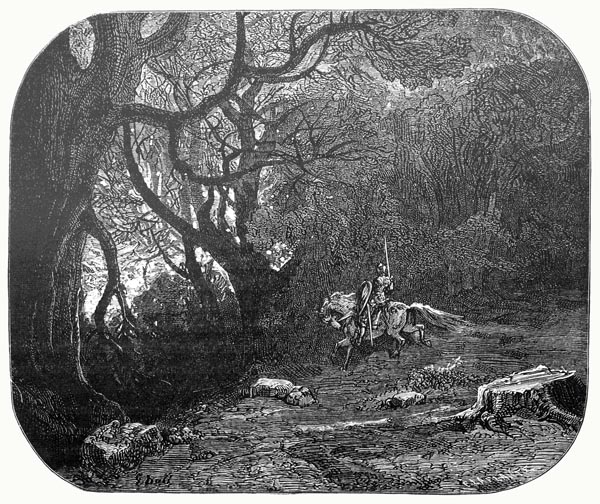
The End of Canto XI of ‘Orlando Furioso’